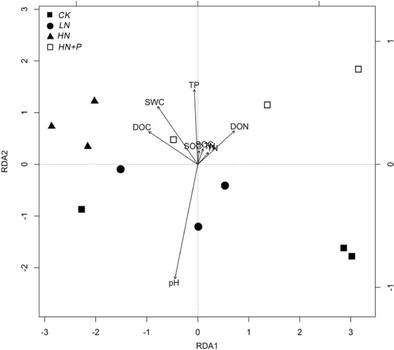华东常绿阔叶林土壤细菌群落变化研究

土壤微生物与地下生物地球化学过程直接相关,在土壤C,N循环过程中起着关键作用。因此,土壤中微生物群落结构、活性和稳定性对土壤功能非常重要。目前许多研究集中在与土壤理化性质有关的土壤细菌群落结构和活性,包括pH,含水量,矿物组成,养分有效性和植被类型等。但是,土壤微生物群落对活性氮沉积的反应尚不完全清楚。
许多方法已被用于检测和表征土壤微生物,16S rDNA测序是一个分子层面的方法,正迅速提高我们对土壤微生物多样性的知识和微生物多样性及其功能之间的关系的理解。已经在各种温带和北方森林生态系统中研究了氮添加对土壤生物地球化学过程的影响及其对土壤微生物的影响。然而,在中国东部的亚热带森林中却没有进行这样的研究。
取材:空白对照组(CK)不含N和P;低N组(50公斤N/公顷),高氮组(100 kgN/公顷),高N+P(100 kg N/公顷+ 50 kg P/公顷),每个处理3个重复;N以NH4NO3的形式施用,P以Ca(H2PO4)2的形式施用。将养分溶于20升水中,将其均匀地喷洒在土壤表面,取土壤样本提取微生物基因组,利用定量PCR和16S rRNA V3-V4基因区测序分析细菌群落的丰度,结构和多样性。
低N和高N处理的土壤中细菌多样性均增加,高N+P处理的土壤中细菌多样性降低,但是α-多样性指数没有受到N添加的显著影响。变形杆菌、酸杆菌和放线菌是所有处理组中的优势菌群,各处理间不同种属的相对丰度也不尽相同,并且不同处理属水平之间存在显著差异。
RDA分析揭示了环境变量与细菌群落组成之间的关系。土壤性质指数共同解释了不同处理的61.07%的变化。在不同的处理中,SWC,pH,DOC,DON,TP,SOC,TN和SOC / TN等土壤理化性质与细菌群落相关(r = 0.134,0.472,0.111,0.122和0.175)。只有CK组和低N处理组中的pH值(P = 0.051)与细菌群落显示出的相关性较弱。
氮添加显著改变了细菌群落的组成和不同门的丰度。本研究结果表明,亚热带常绿阔叶林土壤细菌群落在一定程度上对氮素来源的变化具有一定的适应性。(来源:生物通)
Changes in soil bacterial communities in an evergreen broad-leaved forest in east China following 4 years of nitrogen addition
Abstract Purpose Evergreen broad-leaved forest ecosystems are common in east China, where they are both ecologically and economically important. However, nitrogen (N) addition over many years has had a detrimental effect on these ecosystems. The objective of this research was to evaluate the effect of 4 years of N addition on microbial communities in an evergreen broad-leaved forest in southern Anhui, China. Materials and methodsAllochthonous N in the form of aqueous NH4NO3 and phosphorus (P) in the form of Ca(H2PO4)2·H2O were applied at three doses with a control (CK, stream water only without fertilizer): low-N (50 kg N ha−1 year−1), high-N (100 kg N ha−1 year−1) and high-N+P (100 kg N ha−1 year−1 + 50 kg P ha−1 year−1). Quantitative PCR analysis of microbial community size and Illumina platform-based sequencing analysis of the V3-V4 16S rRNA gene region were performed to characterize soil bacterial community abundance, structure, and diversity. Results and discussionBacterial diversity was increased in low-N and high-N treatments and decreased in the high-N+P treatment, but α-diversity indices were not significantly affected by N additions. Proteobacteria, Acidobacteria, and Actinobacteria were the predominant phyla in all treatments, and the relative abundance of different genera varied among treatments. Only soil pH (P = 0.051) showed a weak correlation with the bacterial community in CK and low-N treatment. Conclusions The composition of the bacterial community and the abundance of different phyla were significantly altered by N addition. The results of the present study indicate that soil bacterial communities in subtropical evergreen broad-leaved forest are, to a certain extent, resilient to changes derived from N additions.
原文链接:https://link.springer.com/content/pdf/10.1007%2Fs11368-017-1671-y.pdf

